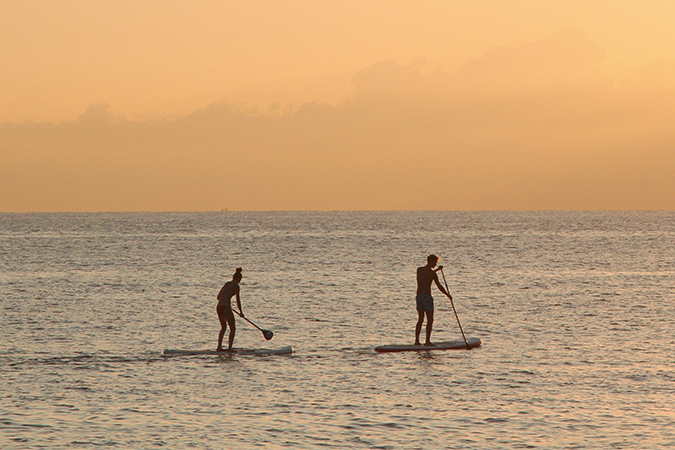
“I’ll meet you on the beach tomorrow morning in front of lifeguard station 9B.”
Bernadette is a force to be reckoned with. Smart, bold, and athletic, she spent months attempting to convince me that I was capable of mastering a stand-up paddle board (SUP) on the open ocean. I finally agreed to give it a try. So there I stood, scrunching my toes into the sand in front of station 9B, awaiting her arrival and nervously studying the ocean’s waves and currents.
She bounded up behind me, toting a 12-foot board—the widest and longest SUP I had ever seen. She handed me an oar and declared, “This equipment guarantees your success. Get on. And by the way, get ready for God to speak to you in a new way.”
And so began my experience of Bernadette’s Catholic mentoring while on the decks of our stand-up paddle boards.
As we entered the ocean, we blessed ourselves with the Sign of the Cross. Bernadette said, “First things first. The Book of Genesis teaches us that God’s Spirit moved upon the face of the waters of creation. That same Spirit is still present, so let’s hang out for a few minutes to thank God for providing the ocean as sign of his love for us.”
She demonstrated proper positioning and posture: “This large board absorbs a lot of wave action, so that means you can allow your body to relax. Listen to how your body informs you to maintain balance and where to place your paddle. Communication with the ocean is like a form of prayer; it’s more listening to God inform us rather than forcing a certain position.”
I learned how to use my peripheral vision to check foot placement: “Keep your sight line ahead of the board. When you look down, you fall down. This reminds us to keep our eyes on Christ and not on earthly matters.”
Before I knew it, I was gleefully paddling alongside honu (Hawaiian sea turtles) and exploring the reef lines.
Of course, a SUP board isn’t required to mentor others. But there are some basic principles that can help us develop our own styles as we move beyond merely teaching about Jesus to mentoring others toward a more loving relationship with and discipleship in him.
First Things First
Convey to students and their families that the Spirit of God moves within them and that they are a sign of God’s love. We do this when we offer to bless and pray over and with them.
Positioning and Posture
We need a reasonable set of rules to maintain order and predictability, but be Christ-centered and gentle in the way rules are communicated and reinforced. We mentor toward loving and well-balanced Christian relationships when we are generous with our gestures of understanding and joyful interactions.
Peripheral Vision
Be mindful of families who may feel at the margins. Perhaps English is not their first language, or they are mourning the loss of a beloved family member. Maybe they are struggling through a divorce or experiencing under-employment and feeling financially overwhelmed. Bring a listening heart to all interactions.
What are some other creative ways that you can mentor others in the name of Christ? May your discernment be filled with joyful discovery. And maybe I’ll see you out on the water someday.
Photo by Tiana on Pexels.





Thank you for the What’s SUP artical. Simple and full of beautiful wisdom.